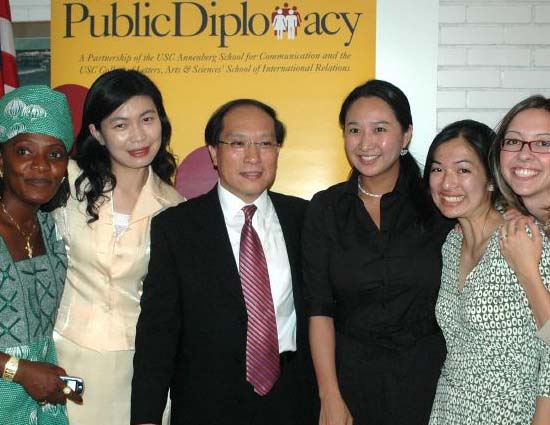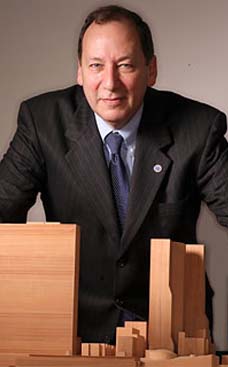
First, fix the public diplomacy function within the State Department. The U.S. Information Agency, once the formal address for our public diplomacy, was folded nine years ago into the State Department where its function now has little presence or focus. And, with less than one-tenth of 1 percent of the funding that the U.S. government provides the Pentagon, those few, hardworking government officials responsible for our public diplomacy have nary the resources nor, it seems, the mandate to tackle their enormous mission. Even Defense Secretary Robert M. Gates has urged "a dramatic increase in spending on the civilian instruments of national security - diplomacy, strategic communications, foreign assistance, civic action and economic reconstruction and development" to improve America's standing in the world. Second, we need a nimble new tech-savvy, nonprofit organization that more readily can combine public- and private-sector expertise and resources in areas such as new media and state-of-the-art communications. This organization needs to be outside the State Department in order to attract nongovernment actors who could help repair America's damaged reputation but who may not want to be officially associated with U.S. foreign policy.
Keith Reinhard and Parag Khanna writes: We cannot afford to squander the opportunity to build on this feeling of hope: The United States must have a strategic, cohesive and comprehensive public diplomacy effort
Don't squander worldwide feeling of hope for America
By Keith Reinhard and Parag Khanna | Commentary |
Story updated at 5:56 pm on 1/8/2009
Photo: DSC_8600 by California Em Flickr Creative Commons Attribution 2.0 Generic
Barack Obama not only won a decisive electoral victory at the polls across America on Nov. 4, he also generated rousing approval across the globe. From Latin America to Europe, Asia, Africa and the Middle East - everywhere, it seemed - jubilant banner newspaper headlines, dancing in the streets and tears of joy reflected a fresh surge of goodwill toward the new president and the United States.
We cannot afford to squander the opportunity to build on this feeling of hope. The United States must have a strategic, cohesive and comprehensive public diplomacy effort.
How? First, fix the public diplomacy function within the State Department. The U.S. Information Agency, once the formal address for our public diplomacy, was folded nine years ago into the State Department where its function now has little presence or focus. And, with less than one-tenth of 1 percent of the funding that the U.S. government provides the Pentagon, those few, hardworking government officials responsible for our public diplomacy have nary the resources nor, it seems, the mandate to tackle their enormous mission.
Even Defense Secretary Robert M. Gates has urged "a dramatic increase in spending on the civilian instruments of national security - diplomacy, strategic communications, foreign assistance, civic action and economic reconstruction and development" to improve America's standing in the world.
Second, we need a nimble new tech-savvy, nonprofit organization that more readily can combine public- and private-sector expertise and resources in areas such as new media and state-of-the-art communications. This organization needs to be outside the State Department in order to attract nongovernment actors who could help repair America's damaged reputation but who may not want to be officially associated with U.S. foreign policy.
That is why a broad range of organizations - including the Council on Foreign Relations, the Center for Strategic and International Studies' blue-ribbon Commission on Smart Power and the Defense Science Board - for several years have called for an entrepreneurial and independent new nonprofit organization to complement and supplement U.S. government public diplomacy efforts.
This new organization should draw upon the creativity and knowledge of communications professionals from the private sector, engage the world's publics in an interactive dialogue, promote shared values and their champions and inform the government's public diplomacy efforts by sharing knowledge of communication, public opinion, foreign cultures and technology.
Based on input from a number of public diplomacy experts, Brookings Institution fellow Kristin Lord recently unveiled a blueprint of such an organization.
The blueprint describes an organization that will conduct research and analysis evaluating perceptions of the U.S. from abroad, and provide strategic direction and funding for universities, nongovernment organizations and corporations to develop innovative new public diplomacy initiatives. This entity also will implement new technologies and media products that support U.S. public diplomacy and act as a convener of practitioners from the U.S. government, scholars and talented visitors from the private and nonprofit sectors to address public diplomacy and communications challenges.
At the moment, federal funding is scarce and in high demand for other priorities. But the Lord proposal actually will cost much less than what we are spending on public diplomacy, and it will have far more effect by activating many more talented potential participants in America's public diplomacy than government at its best can offer.
Anti-Americanism will not end on Jan. 20 with the swearing-in of President Obama. Resentment against us has been building since the fall of communism for reasons ranging from perceived exploitation by American-led globalization, the overriding pervasiveness of American culture and the belief in some societies that our entertainment products corrupt. Yes, some people still believe Americans are arrogant and culturally clueless.
And even if we close Guant namo, pull out of Iraq or reverse other policies that are unpopular abroad, understanding foreign populations is an end in itself and of great strategic value. Listening to foreign populations does more than generate good will; it can help us avoid costly mistakes.
All the more reason for the incoming Obama administration and the 111th Congress to put a new and substantial public diplomacy initiative at the top of their burgeoning list of policy priorities. This nation cannot afford not to.
• Keith Reinhard is the founder and president of Business for Diplomatic Action, a nonprofit consortium of U.S. businesses dedicated to improving the standing of America in the world. Parag Khanna is a senior research fellow in the American Strategy Program and director of the Global Governance Initiative at the New America Foundation.













